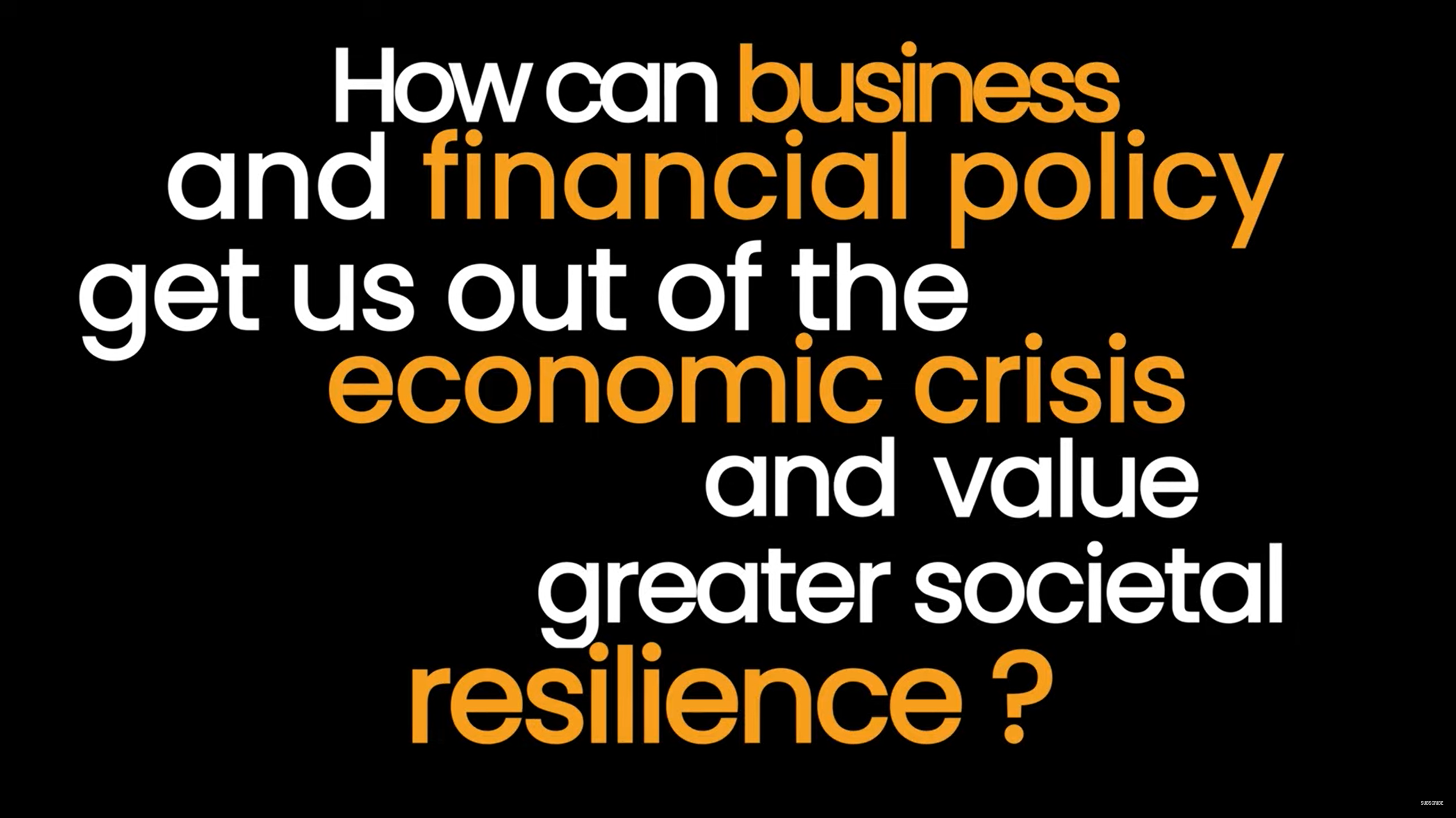
What happened?
Friends of Europe launched its new initiative on the role of the private sector in the European project, which will run through 2023 and culminate at the State of Europe high-level roundtable.
This Policy Insight was the first event of our three-step journey on the private sector as a shareholder – rather than stakeholder – in a Renewed Social Contract, in which Friends of Europe will delve into what this change in responsibilities entails.
The first high-level debate of the initiative, in partnership with Mastercard, brought together Gerassimos Thomas, European Commission Director-General for Taxation and Customs Union; Eimear Creaven, President for Western Europe at Mastercard; Pierre Wunsch, Governor of the National Bank of Belgium; and Laura Sullivan, Executive Director of WeMove Europe.
The debate delved into the role of the private sector as an active shareholder of the European social contract in light of the numerous crises facing Europe, as well as how behavioural taxes could help protect the environment and promote social values. The debate was also the occasion to hear from corporate leaders about why banks and companies today make sustainable behaviour part of their business practice.
The conversation was kickstarted by Wunsch, stating that “firms are there to produce stuff, following the rules set by authorities. But at the end of the day, firms also have to be good citizens,” stressing the responsibility of the financial sector in supporting society in developing sound fiscal policies.
Examining the role of authorities and markets will be an important part of emerging from the economic crisis, but companies themselves have a major part to play, he explained. This means there is “a bit of a role for the state” in promoting responsible behaviour, “but firms should also play their role. We are part of society, not observing at a far distance.”
This also means accepting criticism, Wunsch warned. “Whatever decision you take, there are going to be people who disagree with you.” He said the National Bank of Belgium itself had faced accusations of being “an unelected power” when it decided to communicate about the need for climate action.
Creaven built on this by arguing corporate behaviour should reflect strong leadership and a clear, sustainable vision. “Business is not going to do well in a fractured society, a failing climate,” she explained. Behaviour then means “doing well by doing good,” reiterating Mastercard’s motto.
“In the end, business needs to be incentivised to take risks and there should be a conversation about how to do this,” she accepted. “But business is not defined simply by the bottom line.”
In the “convergence of crises” brought by COVID-19, Russia’s war in Ukraine, the cost of energy and the cost of living, she argued that “this is absolutely the moment to ask: what is our role?”
“We have been very impressed with the direction Europe has taken in managing these crises,” she said. “We have a real opportunity to take a strong role, for instance, in the digitalisation of Europe and protection from cyber-attacks.”
“This is not just about philanthropy. It is about doing what is good for society,” she stressed. “It is really important we make this the DNA of companies.”
The public sector voice was represented by Thomas, who was introduced as the ‘tax man of Europe’. “In the Commission, we are planning a major reform of corporate taxation. This will include a focus on behavioural taxes and help us to move away from fossil fuels.”
“We have proof that taxation can change behaviour,” he explained, pointing to a “massive” switch in consumer habits when tax on cigarettes was increased in the EU a decade ago. However, he stressed that, overall, “when it comes to the environment, we have not changed the tax burden.”
Taxation can bring about change quickly, as well as raising sorely needed government revenue after years of health, energy and geopolitical crises, Thomas said. About half of all tax levied around the EU today is income tax, with 25% consumption taxes and just 10% corporate tax.
Delving deeper into the role of taxation in incentivising the private sector and corporations to be positive actors in a healthy social contract in Europe, Sullivan said: “Our children will ask why we have 50% income tax and 10% corporate tax. We are all structured into a system from the 1970s. This has to change.”
This means supporting “progressive regulation” and transparency, she argued. “So much cynicism and euroscepticism is driven by a perceived corporate capture of Brussels.”
The next events of our three-step journey on the private sector as a shareholder – rather than stakeholder – in a Renewed Social Contract will be held in the spring and fall of 2023.
Related content:
- Shaping Europe’s digital future: considering the impact of the Digital Services Act – Friends of Europe
- Digitalisation and democracy: The role of digital in the new social contract – Friends of Europe
- Making sense of transitions in an age of crises: a new social contract for a new era – Friends of Europe
Schedule
Questions include:
- What does our changed world mean for European and national institutions, the private sector and communities? In what ways has the pandemic heightened citizens’ awareness of the social repercussions of corporate actions, and how can firms become more responsive?
- Are businesses up for the task of being the co-producers of safer, greener and more inclusive societies? For instance, how can businesses have increased responsibilities when it comes to setting the norms both among their consumers and their business models to address carbon reduction?
- Understanding the notion of ‘net positive’ as giving back more than one takes, what is the role of business in today’s European society? How does that materialise in sound climate and social policies?
- How will national institutions such as national central banks leverage their existing financial tools and mechanisms to act as incentives to shape corporations’ behaviours?
- From words to action, how do we speed up mandatory environmental, social and governance (ESG) disclosure requirements that will support systemic changes?
speakers
Eimear Creaven
President for Western Europe at Mastercard
Laura Sullivan
Executive Director of WeMove Europe
Gerassimos Thomas
European Commission Director-General for Taxation and Customs Union (DG TAXUD)
Pierre Wunsch
Governor of the National Bank of Belgium
moderator
Dharmendra Kanani
Chief Operating Officer and Chief Spokesperson of Friends of Europe
Speakers

President for Western Europe at Mastercard
Eimear Creaven leads Mastercard’s business in Belgium, France, Italy, Spain, Portugal, the Netherlands and Luxembourg, through partnerships with financial institutions, retailers, governments and corporates. Creaven is responsible for leading the company’s strategy and operations, driving transformational change across digital payments, cyber services, data-powered insights, and financial and social inclusion, as well as diversifying into new areas, including real-time payments and open banking. With a career spanning over 20 years, she previously served as chief of staff to the President of Internal Markets at Mastercard, director of Alvarez & Marsal in London and vice-president of Allied Irish Banks.

Executive Director of WeMove Europe
Laura Sullivan is the Executive Director of WeMove Europe, a campaigning organisation that connects the activism of people to opportunities for deep and lasting change. She spent the last two decades as a campaigner advocating for social and environmental justice. Laura started out at the European Parliament working as an MEP Assistant with a focus on the Environmental and Development Committees. She then joined the Trade Union Confederation Education International managing programmes on health and education in Asia and the Caribbean. Laura subsequently spent ten years with ActionAid International running the campaigns in Europe and then as Regional Director for Europe and the Americas. She has an MA in Governance and Development specialising in civil society participation. Her main interests lie in systemic change thinking and feminist leadership. She has a passion for all things related to music, language and justice.

European Commission Director-General for Taxation and Customs Union (DG TAXUD)
Prior to his current assignment, Gerassimos Thomas served as the Greek deputy minister for environment and energy. He has held various positions at the European Commission, including as deputy director-general for energy, director of finance at the European Commission Directorate-General for Economic and Financial Affairs (DG ECFIN), head of cabinet and spokesperson for the economic and monetary affairs commissioner, and deputy spokesman for the Commission president. He is the former chair of the European Fund for Strategic Investments (EFSI) Steering Board and previously sat on the board of directors of the European Investment Bank and the European Investment Fund.

Governor of the National Bank of Belgium
Pierre Wunsch is the Governor of the National Bank of Belgium and the International Monetary Fund. He serves as a member of the European Central Bank’s Governing and General councils, the European Systemic Risk Board and the Board of Directors of the Bank for International Settlements. Wunsch also chairs the National Bank’s Resolutions College and the Board of Governors of the King Baudouin Foundation. Wunsch was the director of the strategic finance cell at the Belgian Ministry of Finance during the 2008 financial crisis, prior to which he held various positions within the ENGIE group.
Partners
Co-organised with


Activities
Space solutions for Europe’s challenges: shaping resilience with space…
Past event In person

- Area of Expertise
- Digital & Data Governance
Europe’s digital future: leading the next industrial revolution
Past event In person

to
- Area of Expertise
- Digital & Data Governance
AI & Society 2024: promises and perils in the next EU mandate
Past event IN PERSON & LIVESTREAMED

- Area of Expertise
- Digital & Data Governance
Science for policy
Past event Livestream

- Area of Expertise
- Digital & Data Governance
The digital battlefield: EU-China cybersecurity diplomacy in the 21st…
- Category
- #CriticalThinking
- Author
- By Dr Cristina Vanberghen
The digital battlefield: EU-China cybersecurity diplomacy in the 21st…
- Category
- #CriticalThinking
- Author
- By Dr Cristina Vanberghen
Time for ESA to chart its own course and reduce NASA dependency
- Category
- #CriticalThinking
- Author
- By Susmita Mohanty
Introducing a new method to assess the productivity of human-AI…
- Category
- #CriticalThinking
- Author
- By Smita Samanta & Emmanuel Benhamou

- Area of Expertise
- Digital & Data Governance

- Area of Expertise
- Democracy

- Area of Expertise
- Digital & Data Governance

- Area of Expertise
- Digital & Data Governance
Continue
the debate on
- Debating Europe


